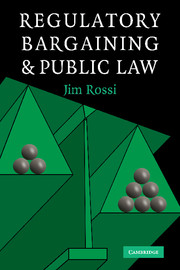Book contents
- Frontmatter
- Contents
- Preface
- Acknowledgments
- 1 The Scope of Regulatory Bargaining
- PART I EXTENDING INCOMPLETE BARGAINS FROM THE ECONOMICS OF THE FIRM TO PUBLIC GOVERNANCE
- PART II INCOMPLETE REGULATORY BARGAINS, INSTITUTIONS, AND THE ROLE OF JUDICIAL REVIEW IN DEREGULATED INDUSTRIES
- 5 Deregulatory Takings and Regulatory Bargaining
- 6 Incomplete Regulatory Tariffs and Judicial Enforcement
- 7 Bargaining in Decentralized Lawmaking
- 8 Overcoming Federal–State Bargaining Failures
- 9 Conclusion: Incomplete Regulatory Bargaining and the Lessons for Judicial Review
- References
- Index of Primary Legal Authorities
- Subject Index
6 - Incomplete Regulatory Tariffs and Judicial Enforcement
Published online by Cambridge University Press: 11 July 2009
- Frontmatter
- Contents
- Preface
- Acknowledgments
- 1 The Scope of Regulatory Bargaining
- PART I EXTENDING INCOMPLETE BARGAINS FROM THE ECONOMICS OF THE FIRM TO PUBLIC GOVERNANCE
- PART II INCOMPLETE REGULATORY BARGAINS, INSTITUTIONS, AND THE ROLE OF JUDICIAL REVIEW IN DEREGULATED INDUSTRIES
- 5 Deregulatory Takings and Regulatory Bargaining
- 6 Incomplete Regulatory Tariffs and Judicial Enforcement
- 7 Bargaining in Decentralized Lawmaking
- 8 Overcoming Federal–State Bargaining Failures
- 9 Conclusion: Incomplete Regulatory Bargaining and the Lessons for Judicial Review
- References
- Index of Primary Legal Authorities
- Subject Index
Summary
Analyzing deregulatory takings through a bargaining lens does not commit courts to an activist role in deregulated markets. Instead, an incomplete bargaining assessment of deregulatory takings suggests that in most instances courts will best promote accountability and transparency, as well as predictability, by deferring to the decisions of regulatory agencies. If anything, clear statement rules are the appropriate default mechanism for courts to invoke in evaluating the availability of compensation against governmental bodies that skirt their regulatory commitments. Absent an express, bargained-for statement of commitment to compensation on behalf of a political institution, courts will not interfere with regulatory transitions. Instead, deference to an otherwise legitimate political process is appropriate. As in other agency regulatory contexts, where judicial deference is the norm, to the extent the political process and expertise of agency regulators is more capable than courts of tackling complex regulatory issues of economic regulation, judicial deference is the most desirable initial stance for courts to take in evaluating the decisions of political institutions in the deregulatory era.
However, courts are also not limited to clear statements and deference in evaluating all issues of public law in a deregulatory environment. Rather, approaching regulation through a bargaining lens provides the foundation for a much more nuanced account of the role of courts in market transitions. Although deregulatory takings address incompleteness in the degree of regulatory commitment, the regulatory process also presents other types of incompleteness, creating need for the judicial response to adapt to the institutional problem at hand.
- Type
- Chapter
- Information
- Regulatory Bargaining and Public Law , pp. 129 - 171Publisher: Cambridge University PressPrint publication year: 2005



